Documenting Zimbabwe’s Decline
Chris Roberts, American Renaissance, April 18, 2020
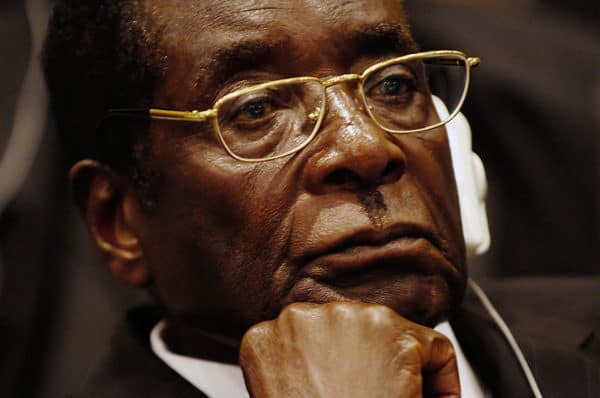
Robert Mugabe
Blacks took power in Zimbabwe in 1980 with Robert Mugabe as their leader. The country’s sometimes slow, sometimes rapid decline in the 40 years since has been instructive — or at least, should be instructive. Stories documenting its run through the “O Tempora, O Mores” section (which was the original newsfeed) of the American Renaissance archive. As we get closer to the present, the news becomes steadily more horrifying, and the possibility of salvation seems more and more remote.
Here’s a partial chronology of a nation that was once widely considered to be a model for all of Africa.
In the face of government threats, one of the oldest white families in Zimbabwe (former Rhodesia) has canceled a celebration of the 100th anniversary of the arrival of its forbears into the African interior. The Rosenfels, a German family that has spent four generations in Africa, planned to celebrate their centenary with a two-day trek in a pair of lovingly restored ox-drawn wagons. They had trained two spans of oxen, and were to drive through the Mangwe Pass just as their ancestors had done.
Zimbabwean Vice President Joshua Nkomo heard of the plan and said that the Rosenfels were “undesirable elements,” who should “leave the country now before it is too late.” One ruling party official called the celebration “a declaration of war against the peace-loving people of Zimbabwe.”
The Rosenfels have already had some of their land confiscated by the government. They canceled the trek out of fear that their remaining property would be seized. [Jan Raath, Officials Declare prominent white family is ‘undesirable,’ Wash Times, 8/18/94.]
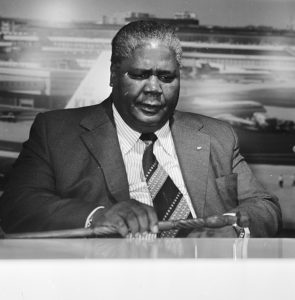
Joshua Nkomo
In April, the son of Joshua Nkomo, vice president of Zimbabwe, died of AIDS. In his funeral address, Mr. Nkomo said that AIDS had been brought to his country by whites in order to depopulate it. He added that whites know the cure for AIDS but refuse to share it with blacks. (Reuter, Nkomo Accuses Whites of Bringing AIDS to Zimbabwe, April 6, 1996.)
Back when it was called Rhodesia and was run by whites, Zimbabwe had one of the best medical systems in Africa. Now, tuberculosis, hepatitis, malaria, measles, and cholera — all preventable — are back on the rise. In 1989, 100 Zimbabweans died of malaria; last year the figure was 2,800. In 1986, the country had 5,000 cases of tuberculosis; last year it had 35,000. Zimbabwe also happens to have the highest HIV infection rate in the world: one quarter of adults are carriers.
In 1993, life expectancy in the country was 61. In two years it is likely to be 49, and if current trends continue it will drop to 40 in ten years. This was the figure when whites began to settle the country 100 years ago. (Michael Specter, Doctors Powerless as AIDS Rakes Africa, New York Times, August 6, 1998, p.1.)
The Zimbabwean Supreme Court has decided that some pre-colonial traditions are better than the white man’s ways. In a unanimous, 5-0 decision, the court found that the “nature of African society” is such that women cannot be considered the legal equals of men. According to unwritten custom, a woman is not really an adult but a “junior male.” This means women do not have the right to inherit property or conduct their own marriage arrangements. In divorce cases they have no legal rights to their children. The Supreme Court justices noted that the Zimbabwe constitution prohibits discrimination on the basis of “race, tribe, place of origin, political opinions, color or creed,” but argued that “these provisions do not forbid discrimination based on sex.” (Neely Tucker, Ruling Strips Zimbabwe Women of Most Rights, Orange County Register, April, 14, 1999, p. 11.)
Black members of Zimbabwe’s parliament have called for therapeutic public beatings of whites as a cure for “racism.” Moses Mvenge, a former guerrilla and the ruling ZANU-PF’s chief whip in parliament, said “Time has come when instant justice must be meted out. I am not calling for the beating up of all whites but only those guilty of such (racist) acts.” “After all we are in the majority,” he added. “It must be an eye for an eye because as long as we don’t do this, they won’t stop. They must be beaten up on the spot.” Michael Mataure, another MP, told his applauding colleagues, “I think what our Rhodesians want is force. A racist must taste his or her own medicine.” “Rhodesian” is the derogatory term black Zimbabweans use for “racist” unreconstructed whites.
Seventy thousand whites account for fewer than two percent of the country’s population, and are now being blamed for the worst conditions to assail the country since white rule ended in 1980. Inflation is running at about 70 percent a year, government services are in shambles, and thousands of Zimbabweans die of AIDS every month. Robert Mugabe, who has ruled the country since 1980, is leading the anti-white crusade, threatening to confiscate white-owned farms without compensation if Britain — the former colonial power — does not hand over money for that purpose. (Cris Chinaka, Zimbabwe MPs Urge Blacks to Hit “Racist’ Whites, Reuters, Nov. 26, 1999. Anton La Guardia, Beat Whites, Zimbabwe Blacks Urged, Telegraph (London), Nov. 27, 1999.)
Although whites are only two percent of the population of Zimbabwe, they own about one-third of the farm land. They grow most of the food and supply virtually all the exports, but president Robert Mugabe has called for confiscation of white farms. In February the government lost a referendum that would have revised the nation’s constitution to extend Mr. Mugabe’s powers and legalize expropriations. Mr. Mugabe encouraged blacks to take the land anyway.

March 2, 2000 – Ian Henderson, his wife Blair, their daughter Jasmine, 4, and their dog, ‘Roo, stand in front of the locked 9-foot gate to their farm house. The Hendersons were besieged by about 150 land invaders, who parked outside their gate and beat drums all night. The next morning they demanded Henderson sign over his 1,000 acre farm, founded by his grandfather in 1946. (Credit Image: © Philadelphia Inquirer / TNS / ZUMAPRESS.com)
Former black terrorists and rural blacks promptly occupied more than 500 white-owned farms. Squatters armed with clubs, spears, axes and a few guns broke down fences and gates and occupied homesteads. The Zimbabwe supreme court has ruled the occupations illegal but police commissioner Augustine Chihuri says they are “a political issue” and therefore “above the police.” He says he does not have the resources to expel squatters. White farmers say there have been no killings so far, but one elderly couple was assaulted and held prisoner in their home for five hours.
Many Zimbabweans, both black and white, think Mr. Mugabe is encouraging the takeovers as a distraction from the terrible mess he has made of the country since he took office 20 years ago. The economy is in a shambles, one quarter of the population has AIDS, and corruption is rampant. The country can barely pay for the 11,000 soldiers it has sent to help prop up the Congo government against insurgents in a war that is deeply unpopular with Zimbabweans.
Earlier in the Mugabe administration the government paid for 2,000 farms but the redistribution program has been mired in mismanagement and corruption, with most of the land going to Mugabe cronies. The president now says white owners must simply walk away from their land since it was originally stolen from Africans by British colonists. (White Farms in Zimbabwe Attacked, Las Vegas Sun, February 29, 2000. Zimbabwe Veterans Seize White Farms, Las Vegas Sun, March 6, 2000. Chris Chinaka, Zimbabwe’s Mugabe Risks Squandering Goodwill, Reuters, April 9, 2000.)
Two more white farmers have been killed, as Zimbabwe continues its chaotic lurch towards elections. International observers are now in place to monitor the June 24-25 ballot, but there is little chance it will accurately reflect voter sentiment. As of June 10, President Robert Mugabe’s supporters had killed an estimated 30 political opponents and had beaten and raped hundreds more. Farm invasions continued unabated.
Mr. Mugabe’s ruling ZANU-PF party, which holds 147 of 150 seats in parliament, faces its first real electoral fight since it came to power 20 years ago. The opposition Movement for Democratic Change (MDC) is only nine months old, but has capitalized on widespread disgust with rampant corruption and mismanagement to mount a serious challenge. Even whites — less than one percent of the population — who have so far been careful to stay out of politics, have rallied to the MDC. It is in this context that ZANU-PF supporters have invaded an estimated 1,000 white-owned farms, where they like to beat and terrorize black workers, intimidate the owners, and insist that the land be turned over to them.
Lately, ruling party militants have taken to invading schools and clinics, where they assault the workers and warn them not to vote for the MDC. Many health and education workers have run away, leaving an unknown number of communities without services. The Zimbabwe Teachers Association estimates that Mugabe-supporters have disrupted at least 200 of the 6,000 government schools.
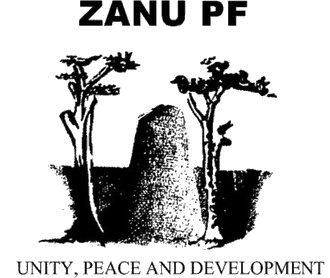
Mr. Mugabe has stepped up the anti-white campaign, insisting that anyone who formerly held dual citizenship has now been stripped of Zimbabwean citizenship and cannot vote or run for office. Of the 70,000 remaining whites, this rule affects an estimated 20 to 30 thousand who had kept British passports. The move is widely seen as a first step towards expulsion. Mr. Mugabe has also denounced white judges, saying that Zimbabweans must not be ruled by “foreigners.” Two of five supreme court judges are white, as are five of 20 appeals court judges.
In the land-grab campaign, on June 2 the state-run Herald published a list of 804 farms — almost all owned by whites — which were to be turned over to blacks. Newly-passed laws give whites no right to appeal the seizures, which were to begin 30 days later. Some whites gave up hope and began moving out. On June 7, Mr. Mugabe said he intended to seize every one of the 4,000 white-owned farms and that if any whites were left on the land it would be due to “our own charity.” He has gone on to urge blacks in neighboring countries also to throw whites off whatever land they may still own.
Needless to say, the already-weak economy is suffering badly. Because of chaos on the farms, Zimbabwe has not been exporting tobacco, and cannot import gasoline and cooking oil. Hundreds of cars line up at the gas stations that still have supplies, and police have used tear gas to break up mobs at cooking oil outlets. Mr. Mugabe says the British are causing the shortages by intercepting Zimbabwe-bound ships and offering them double the market rate to take their cargoes elsewhere. Zimbabwe has defaulted on its debt and the World Bank was expected to halt aid disbursements.
Tourism, which accounts for six percent of the economy, is dead. The country’s main hotel chain estimates lost bookings are costing it $1 million a month. In mid-June, its prestigious Elephant Hills casino and hotel at Victoria Falls had only 14 of its 220 rooms occupied, and management expected to shut down entire wings and send away two-thirds of the staff.
No Western observers think the elections can possibly be fair. Amnesty International says “state-sponsored terrorism” has cowed the opposition, and both the European Union and British Commonwealth have sent teams to watch over what both organizations expect will be a rigged election. The UN had planned to help monitor the voting but pulled out after a disagreement over its role. The US Senate Foreign Relations Committee has approved a bill to suspend American assistance to Zimbabwe until democracy and the rule of law are restored. In rural areas, where 65 percent of the people live, ZANU-PF activists have been telling voters they will die from witchcraft if they vote for the opposition, and many reportedly believe them.
Political violence continues to take a distinctly African form. In early June, Mugabe-supporters sang ZANU-PF songs as they beat to death Thadeus Rukuni, an MDC candidate. Another killing centered on Chenjerai “Hitler” Hunzvi, who is one of the leaders of the farm invasion campaign. He is a doctor with an office in the town of Budiriro. Residents stormed the office, claiming Mr. Hunzvi and other “war veterans” were using it as a torture chamber for political opponents. One person was killed in the fracas.
The latest killings of white farmers bring the total to five. On May 12, John Weeks managed to wound one of five men who attacked his farm but was shot in the stomach and died. At a different farm, Tony Oates also returned fire and killed one of his attackers before being shot to death. Amazingly, farmers who realize they have come to the end of the road in Zimbabwe are looking into farm purchases elsewhere in Africa. Dozens have visited neighboring Zambia, where there are still huge tracts of virgin, arable land. They are optimistic about Zambia because 50 percent of the people live in cities and land is said not to be an emotional issue since so many people work in copper mines.
Zimbabweans voted over the weekend of June 24-26, giving the opposition Movement for Democratic Change (MDC) 57 of 120 contested seats in parliament. This knocked no fewer than seven of President Robert Mugabe’s cabinet ministers out of office, but the MDC thinks it is entitled to even more seats. It is considering lodging formal fraud charges in the case of 28 of the seats won by the ruling ZANU-PF Party. Since President Mugabe had the right to appoint 30 MPs of his choice to the 150-member house, the ZANU-PF’s majority remains intact.
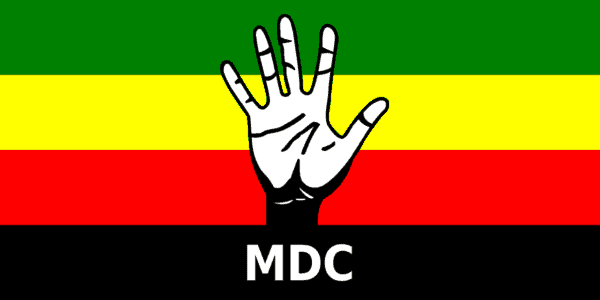
The final run-up to the elections was not quite as violent as previous months, and blacks killed no more whites: the death total remains at an estimated 26 black MDC supporters and five white farmers. Under some international scrutiny — at least by Britain if not the United States — and with hundreds of election monitors keeping watch for obvious election-rigging, the polling went off with only scattered reports of violence.
ZANU activists blocked access to voting booths in some areas and chased away suspected MDC supporters. In a few cases, Mr. Mugabe’s men pulled whites out of line at polling stations and prevented them from voting. One MDC candidate in the province of Mashona-land West escaped from a ZANU mob and spent seven hours hiding in a police station before 100 of his own supporters armed themselves with ax handles and rescued him. To the surprise of no one, Pierre Schori, who headed the 150-member European Union monitoring team, concluded that “the term ‘free and fair elections’ is not applicable in the elections.” Election policing was not as extensive as planned because the government refused entry to 40 monitors from the United States and hundreds of others from Britain, Kenya, and Nigeria.
Since well before the election, Mr. Mugabe had made his views clear. He supported invasions by blacks of more than 1,000 white farms, and threatened to take over white-owned mines as well. He put whites on notice that they are second-class citizens. “Zimbabwe is a black man’s land, and a black man will determine who gets it,” he said, adding that “whites can be citizens in our country, or residents, but not our cousins. They are the greatest racists in the world.”
After the elections, it was dangerous to celebrate MDC victories. Some 30 policemen in two armored cars arrived at a victory party for newly-elected MP, Edwin Mushoriwa, and beat him up along with his supporters. Police and soldiers scoured the bars of Harare, the capital city, beating up people who appeared to be celebrating.
Still, there are signs that some of the anti-MDC chaos is being reined in. On June 30, Big Chitoro became the first ZANU militant to be charged with murder in connection with attacks on MDC supporters. Mr. Chitoro is said to have kidnapped two opposition campaign workers and held them for three days while they were beaten and burned with cigarettes. One died of his injuries and the other was hospitalized.
The MDC sometimes went African, too. At a number of big election rallies its supporters rounded up alleged ZANU partisans and beat them bloody. Also, after the election, a newly-minted MDC MP turned himself in to the police to face charges of attempted murder for having attacked ZANU supporters during the campaign.
Of course, for whites the situation remains extremely dangerous. ZANU’s electoral setbacks have not put an end to the farm invasions, and beatings, thefts, and intimidation are worsening. Some of the squatters, for example, have demanded that farmers pay them rent for the use of their own farms. Others insist that whites sign over title to the farms. The farmers’ union officially advises its members not to submit to these demands and not to vacate their houses. “If you get out of your house, you have lost it,” says the union’s deputy director Jerry Grant, but he acknowledges that following this advice could be dangerous: “What do you say when a widow tells you later it’s your fault for giving that advice?”
Mr. Mugabe vows that all farms will eventually end up in the hands of blacks. In the meantime, farming has been so badly disrupted that Zimbabwe, which normally exports agricultural products, could need food aid in several months.
The situation for whites in Zimbabwe goes from bad to worse. On August 2, at a joint press conference with President Thabo Mbeki of South Africa, President Robert Mugabe promised an end to the invasion of white farms — only to renege the next day. Now he has announced a plan to seize 3,000 more white-owned farms in addition to the 804 already designated for “redistribution.” The army is reportedly planning to provide transportation to settle some 500,000 black families on the farms, which represent about two-thirds of the land owned by whites.
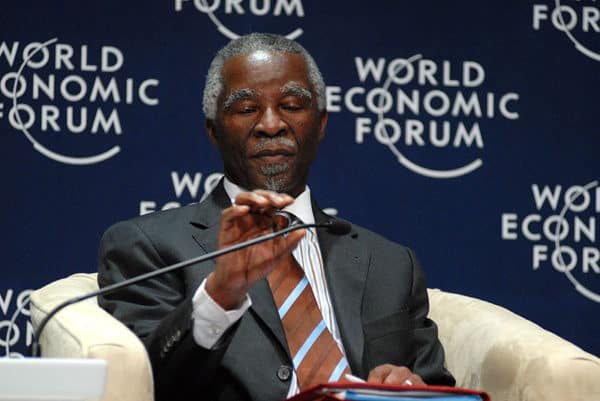
South African President Thabo Mbeki (Credit Image: World Economic Forum / Flickr)
Farmers hoped the electoral success in June of the opposition Movement for Democratic Change (MDC) would rein in some of Mr. Mugabe’s anti-white excesses. To protest violence against farmers and political opponents, the black-run MDC even sponsored a one-day general strike on August 2, which halted activity in the country’s cities. This appears only to have provoked Mr. Mugabe and the “war veterans” occupying the farms. Although no whites have been killed in the past month — the death toll since the occupations began remains at five — threats, beatings, and intimidation continue.
On the same day as the strike, occupiers held 17 farmers prisoner overnight after they went to rescue another farmer who was about to be driven off his land. “They punctured 10 to 12 of our vehicles and we were slapped around,” one farmer said later. “We shared a fire with the veterans and slept in cars.” He also noted that the squatters are extremely volatile: “They are friendly one minute and very hostile the next.”
An official for the largely white Commercial Farmers Union now says, “the safest thing for white farmers is just to look for alternative business opportunities elsewhere in the world and leave Zimbabwe.” An estimated 100 have already fled. Increasing numbers of whites believe Mr. Mugabe will keep up the pressure on them at least until the 2002 presidential elections, which are months away.
Other southern African countries are squarely in Mr. Mugabe’s corner. On August 7, leaders of the 14-member Southern African Development Community (SADC) gave unanimous support to Zimbabwe’s land redistribution program, calling it “just and equitable.” South Africa is a member of SADC, and President Mbeki’s endorsement of naked expropriation terrifies South African whites.
Mr. Mugabe appears not to know or care that without whites, the land he plans to parcel out to blacks will not be nearly so productive as it is now. Zimbabwean blacks who have already taken over white farms show little talent or inclination for modern farming, and driving out whites will seriously damage the country. Agriculture makes up three fifths of the national economy and tobacco — grown almost exclusively by whites — by itself accounts for nearly a third of foreign currency earnings. The disruption already suffered by commercial farmers could well lead to food shortages. Western nations, including the United States, have shown little interest in what amounts to ethnic cleansing of whites. Humanitarian interest in the country will no doubt become fashionable only if blacks begin to starve.
As president Robert Mugabe drives his country onto the rocks, international businesses are clearing out. Airlines can pull out quickly, and Austrian Airlines and Air Austral of the Indian Ocean Island of Reunion have stopped flying to Zimbabwe. Quantas of Australia announced its last flight would be October 26. Cargolux, a freight forwarder, has also suspended operations, citing lack of business and deteriorating conditions. Gas and fuel shortages, electricity blackouts, and interest rates at 61 percent have not helped. International investment is at a standstill. Zimbabwe stopped paying its foreign debts months ago, and the World Bank has officially declared it delinquent and no longer eligible for loans. [Zimbabwe Woes Force Airliners, Forwarders to Quit, Reuters, Oct. 2, 2000.]
The Movement for Democratic Change (MDC), the main Zimbabwe opposition party that won 57 of 120 contested seats in elections in June, has offered a motion to impeach President Robert Mugabe. He is charged with failing to maintain law and order during the elections, during which his supporters killed at least 26 black MDC supporters and five white farmers. Mr. Mugabe helped prompt the measure by granting amnesty to virtually everyone involved in the violence, that is to say, to his own supporters. The impeachment charge also includes an indictment for the slaughter of an estimated 20,000 Ndebele tribesmen during the mid-1980s when Mr. Mugabe was consolidating power for his own tribe, the Shona.
Mr. Mugabe has responded as usual by attacking whites. He now says resistance to the black liberation war of the 1970s was “genocide.” Beginning with Ian Smith, the last white leader of what was then Rhodesia, he promises to charge every white who supported the former regime with war crimes. “After all,” he explains, “in Europe they are still hunting for those behind Nazi war crimes, and Zimbabwe cannot be an exception.” MDC officials have pointed out that this would violate the constitution, which grants amnesty to all participants in both sides of the war, and would open the door to charges against “liberation” leaders as well.
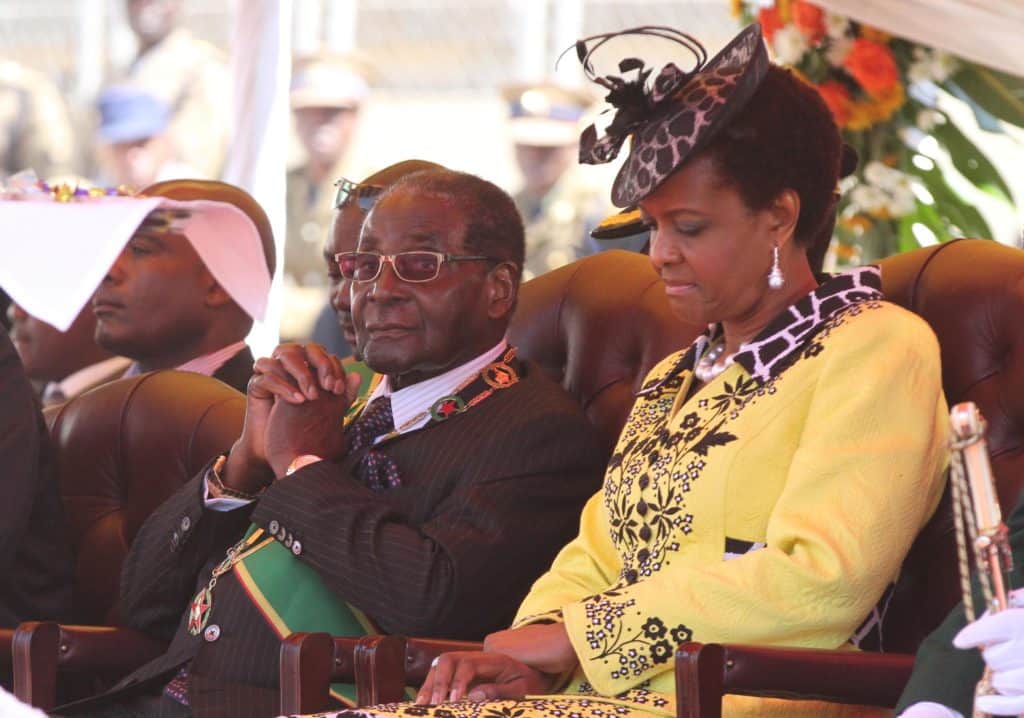
Robert Mugabe and wife Grace Mugabe. (Credit Image: © Stringer / Xinhua via ZUMA Wire)
In the meantime blacks continue to force white farmers off their land and out of business. Production of both food and export crops has plummeted, driving up prices. This has led to riots and looting in the major cities, and increasing numbers of Zimbabweans are ready for Mr. Mugabe go. According to a recent poll, 75 percent of Zimbabweans want President Mugabe to resign and 51 percent would like to see him prosecuted for human rights abuses. [Angus Shaw, Mugabe Threatens To Try Whites, AP, Oct. 26, 2000.]
President Robert Mugabe of Zimbabwe is destroying the one remaining institution in the country that stands between him and absolute dictatorship: the courts. Chief Justice Anthony Gubbay, who is white, has been a thorn in his side for years with his quaint Caucasian views about the rule of law. He has led the Supreme Court’s opposition to the illegal takeover of white farms and against unconstitutional manipulations to keep Mr. Mugabe in power. The regime considers this the worst sort of racism, and one ruling party official says Mr. Gubbay was “infiltrated into Zimbabwe by British intelligence to overthrow the government.” If that’s the case, the government the British were trying to overthrow was Ian Smith’s white regime, since Mr. Gubbay arrived from Britain in 1958.
In February, Mr. Mugabe said he would appoint a new chief justice and that Mr. Gubbay had to resign on March 1. Justice Gubbay refused, opening the door to the interesting possibility there would be two chief justices. Mugabe supporters were furious, and one simply pushed his way into the justice’s chambers and told him to clear out. “The police let me in because I am big,” explained Joseph Chinotimba, who reportedly spent an hour haranguing Justice Gubbay in what cannot have been a pleasant interview. When reporters asked Mr. Chinotimba what he would do if the 69-year-old chief justice does not step aside, he said he and his friends would “declare war.”
Justice Gubbay had a chat with Mr. Mugabe’s justice minister and decided to go on pre-retirement leave immediately and step down 10 months early at the end of June. In Mr. Mugabe’s Zimbabwe this is considered a notable achievement since Mr. Gubbay wasn’t simply beaten up and ridden out of office on a rail. Mr. Mugabe intends to replace the remaining justices and lower-level judges, particularly the white ones.
A compliant judiciary will come in handy. Mr. Mugabe plans to put the opposition leader, Morgan Tsvangirai on trial in April for inciting violence at a campaign rally last summer. Mr. Mugabe is undaunted by the fact that his men were vastly more violent than Mr. Tsvangirai’s. Mr. Mugabe has also kicked two foreign journalists out of the country because they wrote displeasing dispatches. [Stella Mapenzauswa, Zimbabwe Settles Row With Defiant Judge, Reuters, March 2, 2001. Jon Jeter, The ‘Endgame’ in Zimbabwe? Washington Post, March 3, 2001, p. A1.]
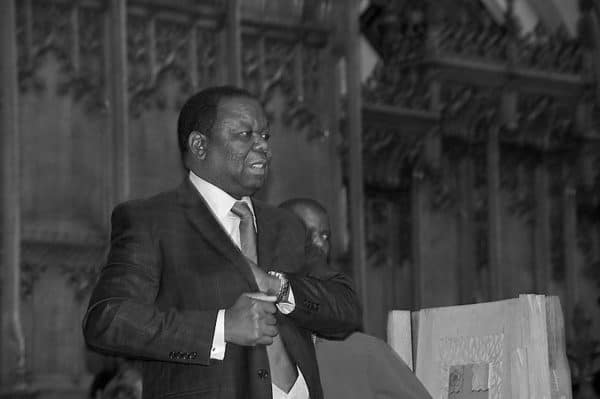
Morgan Tsvangirai (Credit Image: Southbanksteve / Wikimedia)
The occupation of white farms continues with occasionally killings of whites. On March 4 gunmen pumped 15 rounds into Gloria Olds. It is a near certainty that they killed her because she was the mother of Martin Olds, who was one of the seven white farmers blacks killed in the run up to last summer’s election. Although many white farmers have abandoned their land, the 68-year-old Gloria Olds would not run away. [Chris Chinaka, White Woman Farmer Slain in Zimbabwe, Reuters, March 4, 2001.] Her son Martin, an experienced soldier and marksman, held out for two hours against a mass attack on his farm, wounding several assailants. Blacks managed to kill him only by setting his house on fire. When he came out they beat him to mush and then shot him.
On March 30, racial conflict in Zimbabwe took a new turn. One hundred black former employees stormed a meeting of the board of directors-which includes blacks and whites-of the textile firm Merspin Pvt. Ltd. The blacks slapped and kicked the whites, driving them from the room, but left black directors unhurt. The attackers were among 600 workers laid off two years ago, and claim Merspin is racist and owes them money. Eric Bloch, a leading economic commentator in Zimbabwe and a director of the company, was among the whites who were beaten up. “This is pure anarchy, just lawlessness,” he said afterwards. “Those charges of racism are just nonsense.” [Retrenched Zimbabwean Workers Attack White Directors, Reuters, March 30, 2001.]
Deterioration continues in Zimbabwe. On August 26, the British newspaper The Telegraph reported that it had received a copy of a secret government document called “Operation Give up and Leave,” which outlined a terror strategy for ridding the country of whites. “The operation should be thoroughly planned so that farmers are systematically harassed and mentally tortured and their farms destabilised until they give in and give up,” it read in part. It says the “Pamire-silencing method” should be used on any farmer who resists, a reference to Chris Pamire, a businessman who fell out with President Robert Mugabe and died in a mysterious road accident.
A Zimbabwe government spokesman says the document is rubbish, but events seem to be following its plan. Though the area around the town of Chinhoyi has been particularly hard hit by blacks looting and vandalizing white farm houses, the town itself has been safe. Recently, Pres. Mugabe’s followers forced all whites off the streets of Chinhoyi, beating up any they could find. Joy Moolman, a white farmer’s wife, has circulated an e-mail message reporting that blacks later went on an especially nasty tear through the countryside, turning out whites and making off with wagon loads of their possessions. Mrs. Moolman writes that her husband is a pilot and flew over the area reporting which way the gangs were headed so farmers could evacuate their families.
Under the title “Whites Finished in Zimbabwe,” the August 12 issue of the British newspaper Daily Mail published a letter from a white Zimbabwean that read, in part: “There is a fin de atmosphere among white people now, a sad, bitter resignation to the fact that our world is crumbling around us. It’s like going through a bereavement for the beloved country many of our families came to from England 100 years ago. It’s an agonising process: anger, denial, bargaining — then maybe death.
“The entire younger generation of whites know they are not wanted and have left or are leaving. The older generation is still desperate to live out what remains of their lives in what is left of British colonial style . . .”
“Suburban street signs have been removed wholesale — we think they are being melted down and made into coffin handles. Graves have been opened, corpses dumped in the bush and coffins taken for resale, spruced up with the aluminum from the signs.”
He writes that the whole country feels like one big departure lounge, as whites clear out. At 50,000, whites are 0.6 percent of the population, down from 200,000 when Robert Mugabe came to power and asked whites to stay. Even face to face with hatred, whites seem unwilling to shed their illusions. The man writes that one white “revealed that what really depressed him was the seeming indifference of most black Zimbabweans to what is happening to the whites.”
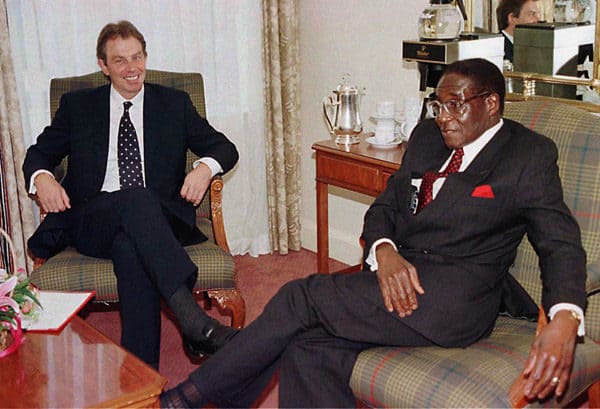
Tony Blair with Robert Mugabe (Credit Image: © PA Wire via ZUMA Press)
He continues: “The government knows if it can drive whites out of Zimbabwe the rest of the world, and particularly the Western media, will lose interest and then it will be able to deal with its political opposition in no uncertain terms. If that happens, there will be a descent into poverty and terror from which Zimbabwe, once a civilised and sophisticated nation, may never emerge.”
Cathy Buckle is a white woman who lives on a farm in Zimbabwe, and writes occasionally about the horrors that beset her country. She reports that although Zimbabwe used to export food, the paralysis caused by farm invasions means the country is running out of food. International relief agencies estimate as many as one million Zimbabweans could go hungry in the months to come. Government authorities acknowledge the crisis and have asked for aid, but they have forbidden aid agencies to distribute the food. “We will not allow strangers to roam around our country interfering,” explained the information minister, saying Zimbabwe would handle distribution. Mrs. Buckle notes that the food crisis will only get worse because the blacks who have invaded white-owned farms are often unable even to grow food for themselves, much less run a commercial farm.
On November 17, a gang of about 500 supporters of President Robert Mugabe rampaged through the streets of Bulawayo, attacking whites. They knocked many to the ground and pulled others from cars and beat them. Most of the victims, both men and women, were old people. Police were present but seemed to be acting mainly as escorts to the mob. [Mugabe’s Mob Rule, Sunday Times (Australia), Nov. 18, 2001.]
Mrs. Buckle writes that white farm houses are being looted with impunity, and that farmers live in fear for their lives. Mrs. Buckle concludes: “We are all alone, powerless and frightened of where, how and when this will stop.”
Neither the 2002 campaign nor the 2002 election has been remotely fair. Since the hard-fought election of 2000 activists in Mr. Mugabe’s ZANU-PF party have killed more than 100 Movement for Democratic Change (MDC) supporters and candidates, and have beaten and tortured thousands. The government has banned MDC campaigning in large parts of the country, and reduced the number of polling stations in Harare and Bulawayo, where the MDC has the most strength. As balloting began on March 8, there were lines of voters a mile long at downtown Harare polling stations, where red tape and antiquated polling equipment were processing an estimated eight people per hour.
Several opinion surveys have shown that the MDC presidential candidate, Morgan Tsvangirai, could beat Mr. Mugabe in a fair election. In the last years of his power, Mr. Mugabe has grown increasingly erratic and anti-white, blaming the country’s annual six to eight percent decline in GNP on sabotage by the white minority, who are no more than 70,000 out of a population of six million. He says Mr. Tsvangirai, whom he calls a “tea boy,” is a stooge of the whites and of Britain, the former colonial power, which wants to reestablish white rule.
It is, of course, ZANU-PF’s mismanagement and corruption that have brought misery and famine to what was once one of Africa’s best-run economies. After strangling the formerly profitable mining sector, Mr. Mugabe turned on white farmers. Whites are virtually the only people in Zimbabwe who run commercial rather than subsistence farms. They accounted for the country’s profitable food exports, and their efficiency kept food prices low. Three years ago, Mr. Mugabe gave bands of thugs the green light to occupy white farms and terrorize workers and owners. Blacks have killed half-a-dozen farmers and have driven thousands off the land. Blacks who occupy the farms have neither the knowledge nor the discipline to run them, and what were once bustling plantations are now shanty towns surrounded by hand-tilled plots. Large-scale farming is essentially at a standstill, and the country now needs food aid. Foreign investment has dropped from $436 million in 1998, before the latest anti-white excesses, to $5.4 million last year. Tourism, which used to be an important industry, has virtually disappeared.
Mr. Mugabe makes no secret of his goals: “Zimbabwe is for black people not white people,” he said at a recent political rally. He has encouraged supporters to mob the headquarters of white-owned businesses, and to beat up passing whites in the streets. Although most Zimbabwe whites have no legal ties to any other country, Mr. Mugabe has revoked their Zimbabwean citizenship and struck many from voting lists. He follows the standard black pattern of blaming everything that goes wrong on whites.
The March elections in Zimbabwe produced their inevitable result, and Robert Mugabe has been sworn in for another six-year term as president of his battered country. His governing ZANU-PF party called the elections “a triumph over imperialist forces led by Britain.”

Until 1979, when whites ran the place and it was called Rhodesia, the country exported food. Now, even the authorities admit half a million people need food aid, and relief organizations warn that the real number is many times higher. Despite bluster in Europe and the United States about possible economic sanctions, there will soon be free food to distribute, which will give Mr. Mugabe and his pals another opportunity for profiteering.
Shortly after the election, Mr. Mugabe issued a new decree to prevent foreign newspapers from stationing correspondents in the country, and to require government accreditation for local newsmen. Police even locked up a 57-year-old woman, Peta Thornycroft, who is a correspondent for the British Daily Telegraph, but released her after a few days.
The dispossession of whites continues. In the immediate aftermath of the election, blacks rampaged through a dozen commercial farms, smashing and looting. They also killed their tenth white farmer. On March 18, Terry Ford found his homestead surrounded by hostiles, and telephoned police for help which, of course, never came. He tried to drive through a fence to get away, but could not break through. Blacks dragged him from his vehicle, tied him to a tree, and beat him mercilessly. When they got tired of that they shot him in the head.
The unpunished expulsion and murder of whites is, of course, the real story in Zimbabwe, even if Europeans and Americans are either too stupid to notice or too afraid to say so. Africans understand exactly what is happening. As a Namibian is reported to have said of the election: “This is a great victory against the white colonialists. Soon we will cleanse Namibia and then South Africa of all Europeans and whites.” [Nicholas Kotch, Commonwealth Blasts Mugabe but Africans Back Him, Reuters, March 14, 2002. Cris Chinaka and Emelia Sithole, West Piles Pressure on Africa over Mugabe, Reuters, March 15, 2002. Emilia Sithole, White Farmer Killed as Leaders, Mugabe Start Talks, Reuters, March 18, 2002. Anthony LoBaido, Zimbabwe Falls Further Into Anarchy, WorldNetDaily.com, March 30, 2002.]
On June 2, blacks shot and killed a white Zimbabwe farm manager. Charles Anderson, 40, ran a farm 50 miles north of Harare, which was scheduled to be expropriated and turned over to an official in the agriculture ministry. No “war veterans” had been camping on the farm, and the killing may have been only the finishing touch to a robbery. The murder brings to 11 the number of white farmers killed since Zimbabwe’s president Robert Mugabe started encouraging dispossession of whites. [Michael Hartnack, White Farmer Killed in Zimbabwe, AP, June 2, 2002.]

Meanwhile the American government has announced another $5 million in food aid to starving Zimbabweans. A State Department spokesman says the money will buy 7,500 metric tons of corn meal and 1,000 metric tons of corn-soy milk. The World Food Program reports that this year’s corn crop will be 67 percent lower than the previous year, mainly because of the mayhem on occupied farms. A reported six million Zimbabweans face starvation. [Loughty Dube, US Offers More Food Aid to Zim, The Independent (London), May 31, 2002.]
At midnight, June 24, about 3,000 white farmers in Zimbabwe officially became criminals if they continued to work their land. This was the deadline Robert Mugabe’s government gave them to stop work, in preparation for complete evacuation of their farms by August eighth. If the government enforces the evacuation, about 95 percent of the country’s white farmers will have been thrown off their land.
Many farmers started packing up , but others kept working. Dairymen pointed out that cows had to be milked or would sicken and die. Even in the face of threats of a two-year prison sentence for continued farm work they refuse to neglect their animals — even though they will lose them when they leave the land. Other farmers continued working because they would not let food rot in the fields in a country facing famine. The UN estimates half the country’s 12.5 million people face starvation because of bad weather and the land seizures. Zimbabwe used to be a major food exporter but will subsist next year on food aid, much of it from the United States.
There are shortages of many staples. Mr. Mugabe routinely accuses Britain, white farmers, and multinationals of deliberately trying to starve the country. In a speech on June 30, he said Zimbabwe’s largest food production company was keeping salt off the market: “I want to say this to National Foods. We want them to come out in the open and tell this nation why they have been hoarding salt . . . If not we will take over their enterprises.” A National Food spokesman said the company has 2,000 tons of salt in storage, which would last the country two weeks. It is all imported, and the government has ordered it to sell at a price that is half what the company paid for it. The spokesman explained that National Food, which is in deep trouble along with the rest of the food sector, cannot afford to sell at a loss.
Zimbabwe’s Agriculture Minister Joseph Made says the food crisis has nothing to do with putting commercial farmers out of business. He says whites, who make up one percent of the population, have fomented a crisis in an attempt to take power. Meanwhile, the European Union has expressed concern-though not about ethnic cleansing. The “haphazard redistribution of property,” it observed, “could worsen the impending [food] crisis.” [Michael Hartnack, Zimbabwe Emphasizes Farm Order, AP, June 27, 2002. White Zimbabwean Farmers Protest Order to Stop Working, New York Times, June 26, 2002. Angus Shaw, Zimbabwe White Farmers Stop Working, AP, June 25, 2002.]
C.G. Tracey was one of the first white farmers to welcome black rule in the former Rhodesia. He had a farm in what is called the Enterprise farming district, which includes some of the best land in Zimbabwe, and is only about 20 miles east of the capital, Harare. He was active in the handover of power to the Mugabe government, organizing some of the important conferences that made it possible. In the early days of black rule he served on a number of agricultural committees and was held in high regard.
This spring, the number two man on the Zimbabwe supreme court, Paddington Garwe, decided he liked Mr. Tracey’s farm and sent in some thugs to kick him out. Mr. Tracey, now in his 80s, is said to be “heartbroken and confused” by his eviction from the farm that has been his life’s work. No doubt he thought his cooperation with blacks would save his neck, but as a former neighbor who has moved to South Africa explains, “Now he is just another white man and they want him to go.”
Before Mr. Mugabe ordered the land grab three years ago, there were 66 white farmers in the Enterprise area. Now there are fewer than a dozen. The other farms have not been distributed to “war veterans.” Instead, they are in the hands of cabinet ministers, generals, and other Zanu-PF bigwigs. [Peta Thornycroft, Zimbabwe Judge Secretly Grabs White-owned Farm, Electronic Telegraph, April 19, 2003.]
A white Zimbabwean farmer reports on what used to be his land:
On our occupied farm, the borehole has been destroyed so there’s no piped water any more. The solar water panels and tanks have been stolen and the huge water reservoir stands permanently empty. Most of the huge gum tree plantations have been felled for firewood. The dairy no longer sees cows with udders heavy with milk, but only lines of clothes hung up to dry on the milking stalls. The tobacco barns are derelict: doors, flues, furnace covers and bricks are being stolen. A handful of huts are dotted in the fields and next to them stand little patches of scraggly, yellowing maize plants which may feed a family for a few weeks at the most. The people there are hungry, the children beg from the kitchens of a nearby boarding school, and the adults queue up for World Food maize, beans and oil. In the main, the 1,000 acres of our farm is a neglected wasteland, the fields empty except for a few painfully thin cattle which are never dipped, dewormed, or de-horned.
Over the road, on what was only one year ago a thriving beef and chicken producing farm, there is absolutely nothing going on. A local village chief has moved into the once-beautiful house and there he lives entirely alone. He has not held out his hand to his fellow villagers, nor does he allow the villagers to graze their cattle there. Nothing whatsoever is being grown or produced on the land and slowly the bush is reclaiming the cattle dip and chicken runs.
These two farms employed two dozen people, and produced milk, timber, beef, lamb, wool, chickens, eggs, fruit and vegetables for the town of Marandera and paid out millions of dollars in telephone and electricity charges, road rates, drought and Aids levies, stock feed and farming equipment. Now, nothing is produced for sale, no one gainfully employed, nothing comes onto or goes off the farms, and there is no more running water. [A Day in the Life . . ., Impact Magazine (South Africa), August/September 2003, p. 5.]
The collapse of agriculture has virtually destroyed Zimbabwe’s economy. Four million people — one third of the population — are on the brink of starvation in what was once a major food exporter. Seventy percent of Zimbabweans are unemployed, and inflation is officially running at 365 percent per year. With black market price gouging, the actual rate is closer to 700 percent. The government can’t print enough money to keep up with rising prices, and blames the cash shortage on hoarding. [Angus Shaw, Currency Shortage Latest Crisis to Hit Zimbabwe, AP, July 31, 2003.]
People are so poor they cannot afford to bury dead relatives. With more than 5,000 people a week dying of AIDS, and a rising overall mortality rate, Zimbabwe has no place to put the corpses. The morgue at Harare Central Hospital was designed for 164 corpses; it now holds nearly 600, with bodies piled on top of each other everywhere. Cremation would help, but Harare’s one crematorium ran out of fuel for its furnaces last June. [Angus Shaw, Full Morgues Reflect Zimbabwe’s Plight, AP, Aug. 10, 2003.]
Roy Bennett, a farmer in Zimbabwe’s Chimanimani district, won a seat in parliament in 2000 as a candidate of the Movement for Democratic Change (MDC), the country’s main opposition party. He is a moderate and was popular among blacks as well as whites. He was one of three whites in parliament, and he persistently protested the injustices of Robert Mugabe’s regime.
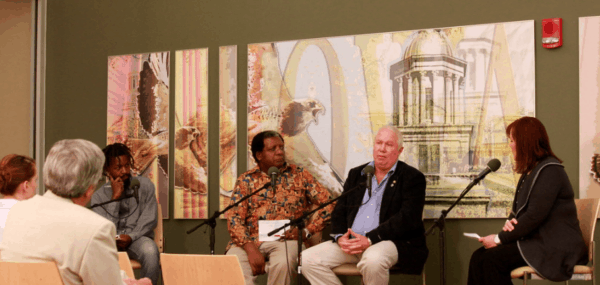
Roy Bennett speaking on democracy in Zimbabwe. (Credit Image: UI International Programs / Flickr)
The government is hostile both to whites and to the MDC, and shortly after the elections, supporters of Zanu-PF, Mr. Mugabe’s party, attacked Mr. Bennett’s farm. They killed two farm workers, raped others, slaughtered cattle, and made Mr. Bennett’s pregnant wife sing ZANU-PF songs in the rain. She miscarried her child. Zimbabwe courts ordered the attackers to stop, but the state and police ignored them. [Judi McLeod, Zimbabwe’s Loneliest Prisoner, Canada Free Press, Dec, 13, 2004.]
On May 19, 2004, Zimbabwe’s Justice Minister, Patrick Chinamasa, told Mr. Bennett in parliament that he would never return to his farm because he was being punished for the sins of his ancestors, who were “thieves and murderers.” Mr. Bennett lost his temper and hit Mr. Chinamasa — though no one was injured. [Zimbabwe MP’s Brawl in Parliament, BBC News, May 19, 2004.]
Normally, a minor assault would be punished by a small fine, if at all. However, a parliamentary committee dominated by Zanu-PF members tried the case and sentenced Mr. Bennett to a year in prison with hard labor. He currently shares a filthy, lice-infested cell with 38 other convicts and his skin is blistered from working in the searing sun. Initially his guards forced him to work bare-headed, but now he is permitted to wear a hat. [First Score for ‘Free Bennett’ Campaign, Sunday Argus (Cape Town), Dec. 19, 2004.]
Inflation in Zimbabwe is currently running at 1,200 percent, the highest in the world. In order “to help commerce and everyday life” the country’s central bank recently decided to remove three zeroes from the currency. The US dollar, which previously traded for 250,000 Zimbabwean dollars, now goes for 250.
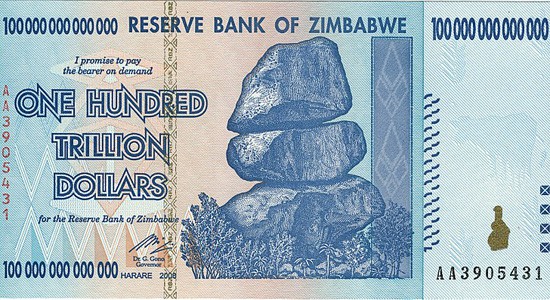
Instead of paying a million dollars for a loaf of bread, Zimbabweans just pay 1,000 — if they have it. As Reserve Bank of Zimbabwe governor Gideon Gono explained, “Our people are experiencing incredible hardships and inconveniences associated with too many zeroes.” [Bill Bonner, Running Out of Money, LewRockwell.com, Aug. 5, 2006.]
Traders were quoting the Zimbabwean dollar at between 995 million and 1.45 billion against the greenback in Thursday morning trade, up from an average 700 million at the beginning of the week. The currency has depreciated by about 84 percent since the central bank effectively floated it in early May after years of an official peg.
Analysts said the rapid weakening of the currency was being driven by inflation expectations as well as huge demand for hard currencies.
. . .
Zimbabwe’s production capacity, largely based on agriculture, has declined sharply mainly due to upheavals on commercial farms following President Robert Mugabe’s drive to seize land from whites to resettle landless blacks.
Prices of basic goods, most of which are now imported, have gone up sharply since the disputed March 29 election in which Mugabe’s ZANU-PF lost its parliamentary majority for the first time in 28 years.
. . .
For instance, a loaf of bread, which cost about Z$15 million before the polls, now costs about Z$600 million.
A two-litre bottle of cooking oil costs about Z$5 billion, almost equal to an average low-income worker’s monthly wage, piling the misery on a country also grappling with food, fuel, water and electricity shortages, 80 percent unemployment and hyperinflation.
Official figures put Zimbabwe’s annual inflation—the highest in the world—at 165,000 percent in February, but analysts say the figure vaulted as high as 1.8 million percent by May.
In 2007, Zimbabwe dictator Robert Mugabe thought he had found the solution to his country’s chronic fuel shortage when “spirit medium” Nomatter Tagarira convinced him she could summon diesel fuel from rocks. Of course, Miss Tagarira had run a pipe from a tank of diesel to a rock, and a hidden assistant turned the tap at her signal, but officials who witnessed the stunt — including the ministers of state security and defense and top military commanders — were astonished. They took off their shoes, sat down on the ground, applauded in unison, and reported to Mr. Mugabe that their fuel woes were at an end.
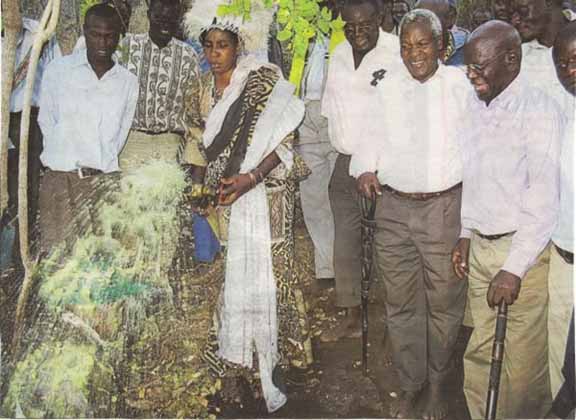
Nomatter Tagarira
The government rewarded Miss Tagarira $2.7 million in cash, flew her around on air force helicopters, gave her a farm seized from a white man, and put a 50-vehicle convoy at her disposal so she could travel to perform night-time rituals needed to maintain her powers. A round-the-clock guard kept watch over the diesel-producing rock. Miss Tagarira lived the high life for a year until Mr. Mugabe asked for another demonstration; perhaps he was wondering what was taking so long to get the taps flowing. This time Miss Tagarira was found out. She skedaddled, got caught, escaped again, and managed to stay on the lam for nearly three years. In late September, a judge sentenced her to 39 months in prison for defrauding the government and supplying “false information to the state.” Magistrate Ignatius Mugova said Miss Tagarira’s lies “brought despondency in the nation.”
Even after her arrest, many Zimbabweans remained convinced of her supernatural powers. At her first court appearance, she appeared to go into a trance, growling as if she were possessed. Many spectators fled the courtroom in terror. [Jan Raath, 3 Years’ Jail for Diesel Diviner Who Took Robert Mugabe for a Ride, The Australian, Oct. 2, 2010.]
Zimbabwe president Robert Mugabe has ordered the nation’s remaining white farmers to be booted off their farms in order that the land be given to black Zimbabweans.
In the harshest official policy on race and land reform in a country that has been close to bankruptcy, the 90-year old autocrat said Wednesday that whites may no longer own any land in Zimbabwe.
. . .
“I have been given a list of 35 white farmers in Mashonaland West alone,” Mr. Mugabe told an emotional crowd in what was billed a patriotic speech. “We say no to whites owning our land and they should go.”
For 16 years, the McKinnons endured the worst of Zimbabwe’s land invasions. On their farm near Harare, they survived kidnapping, torture, imprisonment, eviction attempts and criminal accusations.
. . .
The McKinnons were among the last of Zimbabwe’s dwindling band of white farmers. Of the 4,500 when the invasions began, fewer than 300 remain today.
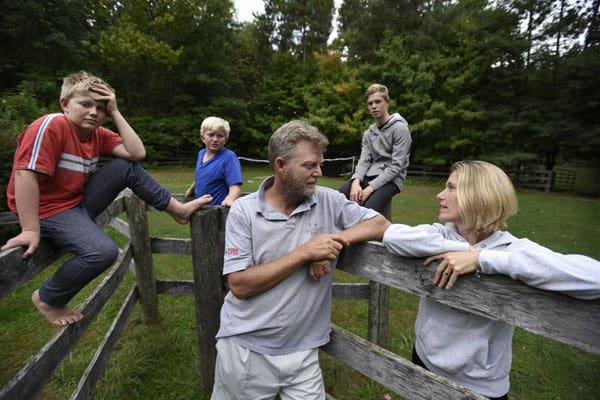
The McKinnon family.
With the Canadian embassy’s help, the family of seven quietly gathered their travel documents this month and slipped out to Harare airport. They had switched off their cellphones and lived clandestinely for their final days in Zimbabwe, terrified the police could arrest them.
. . .
[I]n one incident in 2012, Mark McKinnon was kidnapped and tortured for 24 hours by dozens of young men, believed to be the sons of high-ranking officials who wanted his farm.
“I was badly beaten, and they broke all my teeth,” he said. “It was horrific. But farming is the only thing I know, so I stood up and fought for it.”
This year, the pressure grew worse. Local magistrates issued several eviction orders. He appealed to higher courts, obtaining an injunction against the orders. In July, invaders arrived and began drinking beer outside the house. His father picked up a gun and ordered them to leave. Police arrested him and his wife and jailed them for four days.
Epilogue?
The story that began on April 21, 1980, does not have an “ending” in a literary sense.
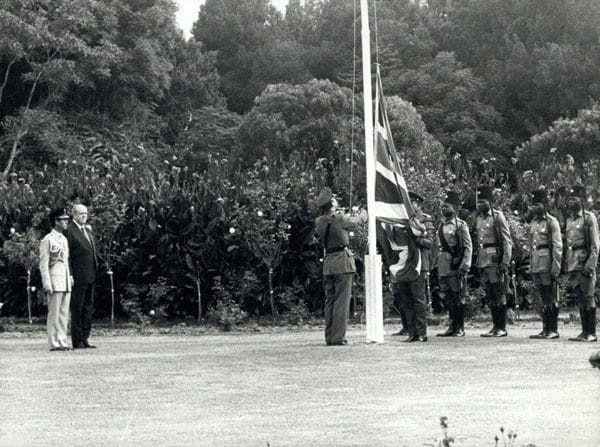
Apr. 21, 1980 – Prince Charles attends Zimbabwe Independence Day Celebrations. He and Lord Soames, the last British governor of Rhodesia, stand to attention as the Union Jack is hauled down for the last time at Government House, in Salisbury, just before Zimbabwe celebrated its Independence. (Credit Image: © Keystone Press Agency / Keystone USA via ZUMAPRESS.com)
In November 2017, “President” Mugabe was finally pressured into resigning during a relatively peaceful coup, and in September of 2019, he died. The black nation he ruled for 37 years does not appear to be better off. The month Mugabe died, the capital of Zimbabwe lost running water.
Just as during the prior two decades, Zimbabwe is a land of disease, violence, inflation, and misery. Its citizens still pour into neighboring countries hoping for a better life as an illegal immigrant. The productive whites who fled are not coming back, nor is the destroyed infrastructure.
Blacks remain firmly in power.















